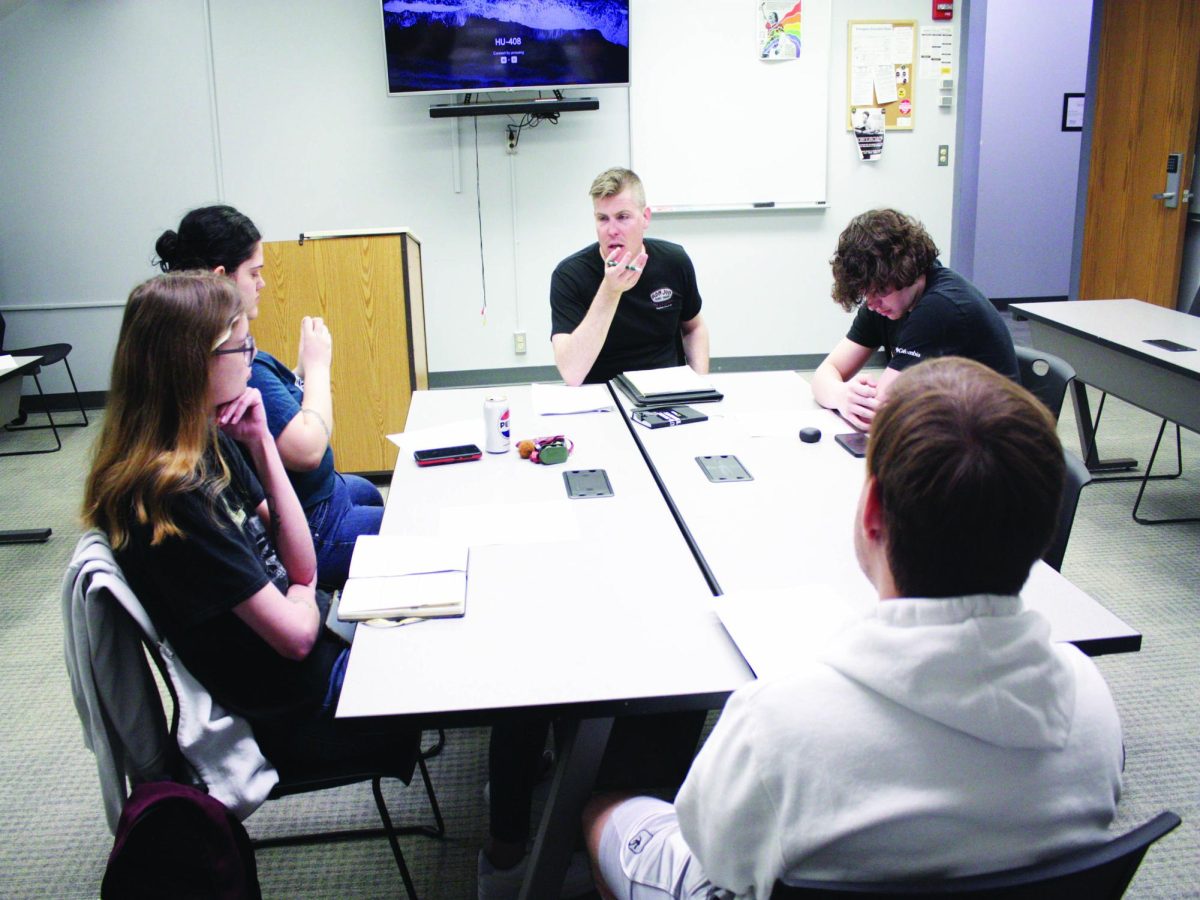WSC student lets dogs out on campus
April 19, 2023
Heads turned as Elias Reiter walked into his British Literature class one sunny Tuesday morning at Wayne State College. Classmates exchanged a few hushed whispers and confused glances as Reiter settled into his desk.
Even Katherine Butler, English professor at WSC, stared at Reiter, unsure of what to say, until Butler muttered “I think you forgot your shoes.”
Hope Steffen, a sophomore at WSC and Reiter’s classmate, considered Reiter’s bare feet jarring to say the least.
“I had never met him before seeing this guy walk barefoot,” Steffen said. “I thought to myself, man this guy is weird.”
Reiter, a senior at WSC, would have to become accustomed to the odd looks and questions ever since he started walking barefoot everywhere on campus in fall 2022. In fact, Reiter said scraped and damaged feet weren’t the only thing he had to worry about when adopting his newfound lifestyle.
“One time, I was walking into the Student Center, and I held the door open for some girls,” Reiter said. “About fifteen minutes later, a friend showed me a snapchat that was sent to them. It was a video from one of the girls behind me laughing and saying to put some shoes on.”
Kyle Jedlicka, a senior at WSC and Reiter’s roommate, said that he agrees with the odd stigma associated with choosing to walk barefoot.
“People normally expect shoes in places where you eat, in the rec or in class,” Jedlicka said. “I feel that with what people expect makes going shoeless so weird.”
Steffen said she eventually got over Reiter intentionally breaking the shoe norm.
“After a couple of days I didn’t even notice,” Steffen said. “I guess if he wanted to walk barefoot that was his business. I’d just see him and think oh, there goes the shoeless guy.”
Reiter said he has tried to determine why WSC students may consider walking barefoot uncomfortable or weird.
“That idea of what’s the main fear of walking barefoot, that individual stigma,” Reiter said. “Well, what would people think of me? It’s not an obtrusive social norm. But it’s something so engrained in us that we have to wear shoes that when someone challenges that it’s so weird.”
Jedlicka said walking barefoot may be polarizing since it goes directly against conventional social norms.
“We just aren’t used to seeing someone casually walk barefoot throughout a library or in classes,” Jedlicka said.
Luckily for him, Reiter said the WSC students and faculty’s response was one of general confusion and interest rather than blatant negativity.
“It was more so a conversation starter, wanting to know why,” Reiter said. “Students would mostly make jokes about my dawgs being out. Teachers mostly ignored it and a few outside of class wanted to discuss why.”
Although Reiter is respectful of all preferences, shoeless or not, Reiter said he feels a tiny spark of rebellion when he walks barefoot.
“There’s no technical rule against it,” Reiter said. “Why does someone actually care about me going barefoot? I think it points at the reality that sometimes we only act to appease people. Those arbitrary rules can be healthily challenged.”
Reiter said his shoeless lifestyle even sparked a rule change in eating places on campus after he walked into lower barefoot.
“I had been wearing shoes in the upper gag and when I went into the serving area in lower,” Reiter said. “But didn’t think the entire lower gag was considered a food service area that required shoes. Then, signs just started appearing in September 2022 that said shoes were required in all dining areas.”
In fact, Reiter said there are no explicit dress code policies to be found in the WSC Student or Employee Handbook about wearing shoes, except in the Rec Center.
“There’s still the question if there is really a rule or not,” Reiter said. “I do want to respect people who really don’t want to see feet while they’re eating. I’m more interested in the intellectual study about why we even wear shoes.”
Reiter said he had to first overcome the fear of stepping on something in unknown terrain.
“Sure, I’ve gotten blisters and scratches at first,” Reiter said. “But I was more focused on developing a sense of trust and freedom walking in nature.”
As the school week ended, Reiter strolled across the Willow Bowl, thankful to feel the freshly cut grass beneath his bare feet. The crunch of concrete as Reiter wandered across the sidewalk. Reiter felt satisfaction in breaking a trivial social norm, which almost outweighed the confused stares and questions from Reiter’s peers at WSC.
“As a society, we’re so worried about our exterior freedoms that we don’t even realize that we aren’t free from ourselves,” Reiter said. “It’s [kind of] neat to just be free to roam without having to put on shoes.”







